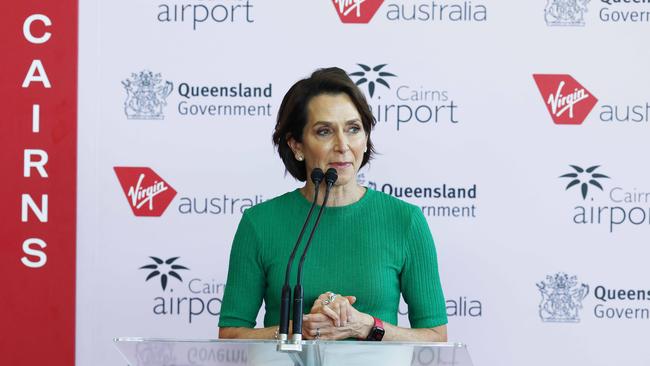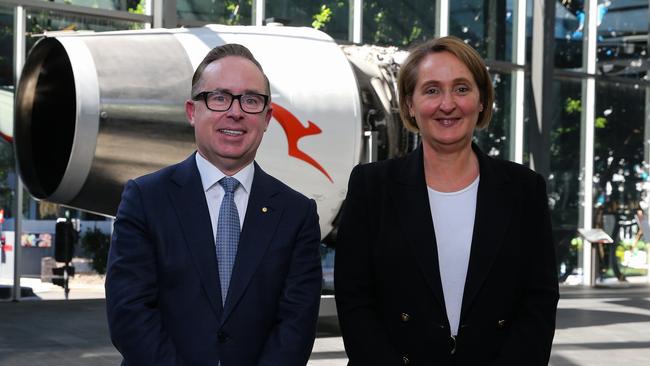A ‘mountain of capex’ awaits new Qantas chief Vanessa Hudson
A ‘mountain of capital expenditure’ awaits incoming Qantas CEO Vanessa Hudson, after a brief honeymoon period.
Newly appointed Qantas chief executive Vanessa Hudson faces a “mountain of capital expenditure” when she takes over from Alan Joyce, ensuring she will get an all-too-brief honeymoon in the job.
The grim forecast from analysts came as Ms Hudson basked in a flood of congratulations, led by her main rival, Virgin Australia CEO Jayne Hrdlicka.
“Vanessa will be an exceptional CEO for Qantas. She is a natural leader, an excellent executive and a great person,” said Ms Hrdlicka who was the first woman to lead a major Australian airline following her 2012 appointment as Jetstar CEO.
Ms Hrdlicka also reached out to her former colleague on LinkedIn, noting Ms Hudson’s promotion was “hard-earned and well deserved”.

Emirates’ Australasia vice president Barry Brown offered his congratulations as well, noting he had worked with Ms Hudson on many occasions, particularly through the airlines’ now ten-year-old codeshare partnership.
Congratulations also came from Air New Zealand boss Greg Foran, who said his airline and Qantas had a “long history of driving each other to be better for customers”.
“I look forward to that continuing under (Ms Hudson’s) leadership,” Mr Foran said.
The generally well-received announcement by Qantas on Tuesday, was only tempered by a negative sharemarket reaction and analyst warnings that Ms Hudson faced a “mountain of capital expenditure”.
Morningstar equity analyst Angus Hewitt estimated Qantas would need to spend about $15bn over the next five years on its ageing fleet, or more than double that of the past five years.
“Qantas’ fleet of more than 300 planes represents substantial capital investment, and Covid-19 delays and cancellations in aircraft deliveries have exacerbated Qantas’ already ageing fleet,” Mr Hewitt said.
“With the first new aircraft deliveries now beginning to come online, we estimate the Qantas fleet is about 14-years old on average and about 11-years old for the Jetstar brand.
“This compares with about 11-years for Virgin Australia and about nine years for Air New Zealand.”

Over the long term, Mr Hewitt predicted that fleet expansion, replacement and refurbishment would “absorb meaningful cashflow and constrain returns to shareholders”.
“While new aircraft can offer higher customer appeal and significant benefits, including lower fuel costs and less frequent heavy maintenance, these benefits are often offset by the additional capital cost and are typically competed away over time.”
In the meantime, Qantas was enjoying optimal conditions with demand for travel strong, capacity constrained and jet fuel prices moderating.
Mr Hewitt suggested that was unlikely to last as Virgin Australia looked to pick up market share ahead of a potential float, Rex expanded its footprint and Bonza gained momentum.
“We don’t think Qantas has carved a competitive advantage as it fundamentally faces the same challenges confronted by all airlines,” he said.
“Airlines globally lack economic moats due to a business model with high fixed costs not conducive to rational pricing, a lack of barriers to entry and low switching costs. We expect these conditions which plagued the airline industry before the pandemic to return.”
Samuel Seow of Citi Research took a similar view, pointing out Qantas had some “emerging issues in the next leg of recovery like market share, ticket reductions and fleet renewal”.
“Subsequently, we thought the business needed an updated strategy,” said Mr Seow, adding that it was “good timing” for a new CEO as the airline entered a new phase.
Qantas shares continued to lose ground in morning trade on Wednesday, to be down 1.5 per cent at midday, at $6.45.








To join the conversation, please log in. Don't have an account? Register
Join the conversation, you are commenting as Logout